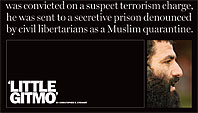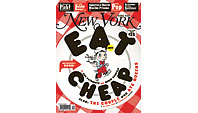
1. Christopher S. Stewart’s report on the secretive “Communication Management Unit” terrorist prisons of the Midwest (“ ‘Little Gitmo,’ ” July 18–25) sparked cries of outrage from readers sympathetic to its central figure, the Albany imam turned Terre Haute inmate Yassin Aref. “First a preemptive war, now preemptive arrests?” asked an incredulous commenter at nymag.com. “We were attacked, but now the U.S. has become the aggressor on every front, and I can’t tell you how much that disturbs me.” “Thank you for this excellent article which is also so heartbreaking,” wrote another reader. “I really wonder where this country is being led by hate, vengeance, and conscious ignorance of an entire people. I hate that my tax dollars are going toward this, and I hope the day comes soon when CMUs are no longer a reality but a shameful part of history, like the internment camps of the Japanese, that w=e look back on and realize were a horrible mistake.” Activist blog The Sparrow Project praised the story as “a hard-hitting and deeply personal investigation.” “I had read about some American Muslim families in search of their fathers’ whereabouts or evidence for any crime committed back in the 1990s,” wrote the Albany Times Union’s Muslim Women blog. “I knew that once the term ‘terrorist’ is used to smear someone’s name, it’s difficult to remove the stigma. But it did not quite hit home until the Aref case … I know the entire family (and have even taught his children in school), and I know this is a clear injustice. The children did not talk about this case in school, but everyone knew the weight they carried on their shoulders.” The story hit even closer to home for another reader, Andrew Stepanian, who spent nearly six months in a CMU. He wrote on our website, “All of the cases are men who are not actually convicted of participating in violent acts, but rather accused within broader conspiracy charges that almost always involved nonviolent, noncriminal conduct that was somehow loosely conflated with an organization labeled as ‘terrorist.’ These people are not bad people; some may have made mistakes, [but] they are certainly not terrorists; they are a black eye for our democracy, and a difficult conversation that our government is not ready to have.” Other commenters didn’t share the outrage over the CMUs. “Maybe that is what prisons should be like for real, antisocial, dangerous offenders,” wrote one in response to a Q&A with Stepanian. “Religionists, extremists, … and most zealots who can’t work within the system need to be totally contained.”
2. Nitsuh Abebe’s boisterous defense of pop music against the charge of narcissism (“We Must Be Superstars,” July 18–25) earned accolades from all over. “We’ve needed something like this for a while: a unified theory of new pop that’s unapologetic, sweeping, and points out that things are actually kind of looking up for anyone who’s interested in the idea of popular music as an inclusive, constructive reflection of society,” wrote Spencer Kornhaber at The Atlantic’s website. Cheering Abebe as “always on-point,” the Chicago Reader’s Bleader blog called the essay “a compelling takedown of the whole [narcissism] meme, indicating that it might not be the escalating self-regard of America’s youth, but rather … marginalized people who sometimes talk about themselves as a method of empowerment.” Amanda Marcotte at Pandagon dug it, too, and extrapolated Abebe’s thesis all the way back to disco: “I cannot recommend Nitsuh Abebe’s defense of ‘narcissism’ in pop music in New York Magazine enough. Just drop what you’re doing and read the whole thing … Some of these songs are trash, some aren’t, but it really made me think about a long line of hits from the ’70s that were about preening and showing off and demonstrating bravado and kicking ass.” Commenters at nymag.com were, typically, less impressed. “Let’s not spend so much energy defending pop,” pleaded one. “If you like it, you like it. Enjoy it without all of the excuses. But let’s not try to call these people talented. They’re a pair of tits, a couple of tattoos, and a weave. The rest is computer-assisted.” Another chimed in: “Could anything be more farcical than the narcissism of Gen Y as it heads blithely into the whole rest of its generational life watching America do nothing but decline? This generation of narcissists is just going to get poorer and poorer as the country gets more and more bankrupt. I hope Lady Gaga enjoys licking the boots of her Chinese masters.”

3. This year, the annual Cheap Eats guide featured a special gastronomic tour of Queens (“Devouring Queens,” July 18–25) and earned a chorus of sarcastic cheers from local readers. “I want to congratulate you for obtaining an E-ZPass and getting a map that shows you the bridges and tunnel that go to Queens!” one commenter wrote. “Delighted that New York Magazine discovered what everyone in Queens already knows—that the best, most authentic, and reasonably priced food is available in Queens,” added another. At Chowhound, at least one reader was genuinely impressed: “Of course there are a ton of restaurants they quote unquote missed, but it’s not supposed to be a comprehensive guide … it’s a spotlight. I love the selections, especially Ploy Thai way up there on the list.”
Send correspondence to: nymletters@nymag.com